
Convolvulaceae, commonly called the bindweeds or morning glories, is a family of about 60 genera and more than 1,650 species. These species are primarily herbaceous vines, but also include trees, shrubs and herbs. The tubers of several species are edible, the best known of which is the sweet potato.
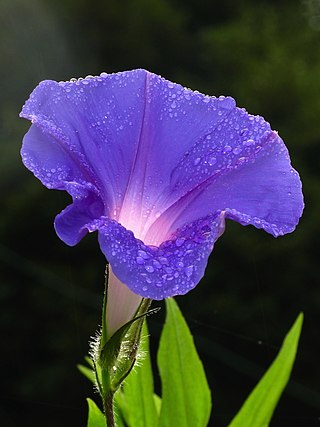
Morning glory is the common name for over 1,000 species of flowering plants in the family Convolvulaceae, whose current taxonomy and systematics are in flux. Morning glory species belong to many genera, some of which are:

Convolvulus is a genus of about 200 to 250 species of flowering plants in the bindweed family Convolvulaceae, with a cosmopolitan distribution. Common names include bindweed and morning glory; both are names shared with other closely related genera.

Ipomoea is the largest genus in the plant family Convolvulaceae, with over 600 species. It is a large and diverse group, with common names including morning glory, water convolvulus or water spinach, sweet potato, bindweed, moonflower, etc. The genus occurs throughout the tropical and subtropical regions of the world, and comprises annual and perennial herbaceous plants, lianas, shrubs, and small trees; most of the species are twining climbing plants.

Calystegia is a genus of about 25 species of flowering plants in the bindweed family Convolvulaceae. The genus has a cosmopolitan distribution in temperate and subtropical regions, but with half of the species endemic to California. They are annual or herbaceous perennial twining vines growing 1–5 m tall, with spirally arranged leaves. The flowers are trumpet-shaped, 3–10 cm diameter, white or pink, with a sometimes inflated basal epicalyx.

Calystegia sepium is a species of flowering plant in the family Convolvulaceae. It has a subcosmopolitan distribution throughout temperate regions of the North and South hemispheres.
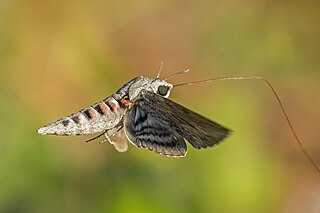
Agrius convolvuli, the convolvulus hawk-moth, is a large hawk-moth. It is common throughout Europe, Asia, Africa, Australia and New Zealand, partly as a migrant. In New Zealand, it is also known as the kumara moth, and in the Māori language as hīhue.

Calystegia soldanella is a species of bindweed known by various common names such as sea bindweed, seashore false bindweed, shore bindweed, shore convolvulus and beach morning glory.
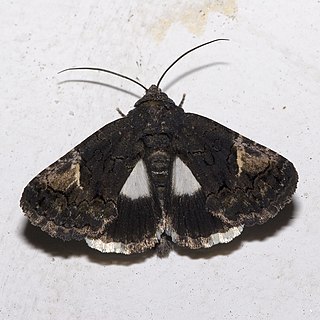
Aedia funesta or the druid is a moth of the family Erebidae. It is found in Central Europe, Southern Europe, Anatolia and Iran.

Emmelina monodactyla is a moth of the family Pterophoridae found in Africa, Asia, Europe and North America. It was first described by Carl Linnaeus in 1758.

Stigmella freyella is a moth of the family Nepticulidae. It is found from the Netherlands to the Baltic region and Russia, southwards to the Mediterranean region. It is also found in North Africa.
Bedellia ehikella is a moth in the family Bedelliidae. It is found in Ukraine, Spain, Sardinia, Italy, Croatia, the Czech Republic and Hungary.
Bedellia yasumatsui is a moth in the Bedelliidae family. It is known from Australia and Papua New Guinea.
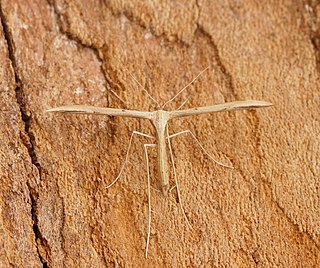
Emmelina argoteles is a moth of the family Pterophoridae found in Asia and Europe. It was first described by Edward Meyrick in 1922.

Helcystogramma convolvuli, the sweet potato moth, sweetpotato webworm moth, sweetpotato leaf roller or black leaf folder, is a moth of the family Gelechiidae. It is mainly found in Asia and Africa, but there are also records from Oceania, the Middle East, the Caribbean and Florida in the United States. The species is also found on the Canary Islands and Madeira.
Bedellia minor, the Florida morning-glory leafminer moth, is a moth in the family Bedelliidae. It is found in Florida in the United States and on Cuba.

Bedellia psamminella, the convolvulus skeletoniser, is a moth in the family Bedelliidae. It is found in New Zealand.
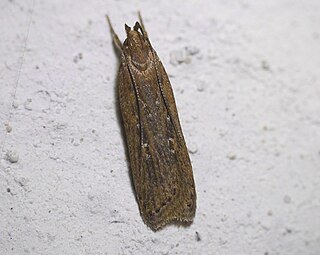
Helcystogramma triannulella is a species of moth in the family Gelechiidae. It was originally described by Gottlieb August Wilhelm Herrich-Schäffer in 1854. It is found in south-western and south-eastern Siberia, the Caucasus, Transcaucasia, Kazakhstan, Korea, Japan, China, northern India and large parts of Europe, except Ireland, Great Britain, the Netherlands, Denmark, Scandinavia, the Baltic region and the western Balkan Peninsula.
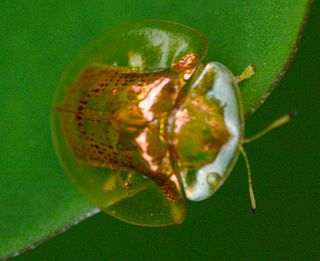
Aspidimorpha dorsata, commonly known as golden tortoise beetle or furcated tortoise beetle, is a species of leaf beetle widely distributed in Oriental region from Sri Lanka to South China towards Java, and Borneo.




















